Danny Dorling's Blog, page 18
June 24, 2019
Inequality: Lessons from History
Penny Bickle, David Wengrow, Kate Pickett and Danny Dorling speaking at the Festival of Ideas, Ron Cooke Hub, University of York, on June 10th 2019.
An audio recording of the talks and discussion can be found on this page below, along with a brief description of each speaker. This event arose from Penny’s early career work, called Counter Culture. She focused on the Neolithic period in central Europe, when farming spread across the continent. A slow gradual increase inequality and complexity had been presumed for this region, but thanks to high resolution chronologies and other analyses we now know that change was not steady, meaning we can challenge and expose narratives of uninterrupted progress towards ever greater inequality in the very distant past.
Very recently a team of United States based archeologists working near Lake Turkana in Kenya discovered graves which lead them to conclude that five thousand years ago large groups of people once shared workload without social hierarchy successfully, generation after generation, for centuries.
Four thousand years ago the people of what later came to be known as the ancient Indus Civilization built cities without great social hierarchies. One was Harappa, which had well-planned wide public streets, both public and private wells, drains, bathing places and was served by communal reservoirs. Until the 1920s nothing was known of this history at all. At school we were was taught that it had been the Romans who first did these things, but they were just the first in Europe, not the first in the world.
Assembly-based democracies have recently been dated back to contemporary Syria, Iraq, Iran. In India they are thought to have emerged in the early Vedic period where ‘republics governed by assemblies became common’(John Keane, The Life & Death of Democracy, London, Simon & Schuster, 2009, p1933). These were republics recognizing that: ‘although people were not angles or gods or goddesses, they were at least good enough to prevent some from thinking they were. Democracy was to be government of the humble, by the humble, for the humble.’ Such ideas travelled and where adopted by the young. They traveled, to Phoenician cities like Byblos and Sidon, then slowly on to Athens. Because Athens was the nearest to Europe they reached we tend to only remember Athens.
Wikipedia used to report that ‘The oldest known existence of a democratic kingdom (Ganarajya) where the king was chosen by people’s votes can be traced way back in 599 BC at Vajji, Vaishali in ancient India. It was the birthplace of 24th and last Tirthankara in Jainism, named Mahavira.’ But that statement has now been edited away and a longer more convoluted description has replaced it has academics typing furiously hidden behind pseudonyms on the web today argue over the past because they each want to paint it differently in their attempts to shape a different future.
The idea that all were equal did not begin in one place. It was obvious from the outset. Early democracies in Australia may be the longest un-interrupted examples; generations that merged into dreamtime. But even in miserable cold Devon, 2000 years after the socialists of Lake Turkana were at work, the pattern of Devon’s ancient stone dwellings suggest that there was little in the way of social hierarchy and that war was rare because, without elites, who is there to order you to fight each other?
In China, over one hundred generations are thought to have lived much the same life, stable and sustainable over and over again at a high population density, and that is only possible when the elites are controlled. Out-of-control Elites lead to war (see: F. H. King, Farmers of Forty Centuries: Organic Farming in China, Korea, and Japan, Dover Publications; Dover Ed edition, 2004, first published in 1911).
There are always a few who suck up to elites and who suggest all will be well if we just allow a few who know best for us to be in control. In 2018 Steven Pinker wrote a book titled ‘Enlightenment Now: The Case for Reason, Science, Humanism, and Progress’. He suggested that today the human race has never had it so good. And as a result Bill Gates declared it to be: ‘my new favorite book of all time.’ Bill may have a person who reads books and write comments about them for him. So it may not be Bill’s fault that he so enthusiastically supports arguments that are so easy to dismiss or commits himself to never finding another book so inspiring in future.
Panel Members:
Dr Penny Bickle (Chair) is a Lecturer in Archaeology at the University of York where the main focus of her research is Neolithic Europe. Working at the intersection of science and theoretical archaeology, she applies bioarchaeological methods to various sites and time periods to inform on issues of identity and social diversity. She is particularly interested in how we can use burial practices to uncover the social lives and lifeways of the earliest farmers in Europe. She is currently directing the Counter Culture project, funded by the AHRC.
David Wengrow is Professor of Comparative Archaeology at University College London. His books include What Makes Civilization? and The Origins of Monsters. David is currently working with David Graeber on a whole series of projects completely re-imagining the question of ‘the origins of social inequality’, starting with how the question is framed to begin with. He is currently collaborating on the AHRC-funded project, Radical death and early state formation in the Ancient Near East, with Brenna Hassett.
Kate Pickett trained in biological anthropology at Cambridge, nutritional sciences at Cornell and epidemiology at UC-Berkeley. She is currently Professor of Epidemiology in the Department of Health Sciences, University of York, and the University’s Research Champion for Justice and Equality. Kate was an UK NIHR Career Scientist from 2007-12, is a Fellow of the RSA and a Fellow of the UK Faculty of Public Health. She is co-author, with Richard Wilkinson, of The Spirit Level and The Inner Level. The Spirit Level was chosen as one of the Top Ten Books of the Decade by the New Statesman, winner of Publication of the Year by the Political Studies Association and translated into 25 languages. Kate is a co-founder and trustee of The Equality Trust.
Danny Dorling is Professor of Human Geography at the University of Oxford. He went to university in Newcastle upon Tyne and grew up in Oxford. With a group of colleagues he helped create the website worldmapper.org which shows who has most and least in the world. His work concerns issues of housing, health, employment, education, wealth and poverty. With the help of many colleagues, often in collaboration, he has published over 40 books including many atlases, and Injustice (2015); A Better Politics (2016); The Equality Effect (2017); Peak Inequality (2018) and Rule Britannia: Brexit and the End of Empire (2019). He is an Academician of the Academy of the Learned Societies in the Social Sciences and was Honorary President of the Society of Cartographers from 2007 to 2017.
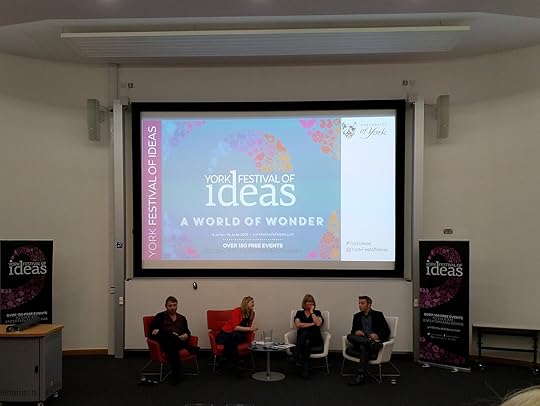
Bickle, P., Wengrow, D., Pickett, K., and Dorling, D. (2019) Inequality: Lessons from history, Ron Cook Hub, York: Festival of Ideas, June 10th 2019.
June 18, 2019
Brexit: the future of political engagement, trust and democracy
The vote to leave the EU was the last gasp of the old empire working its way out of the British psyche. Or so argues our keynote speaker, Danny Dorling, author (with Sally Tomlinson) of Rule Britannia: Brexit and the end of empire. Danny is joined by three panellists, political journalist Martha Gill, who has written about young people’s future engagement with traditional political parties; Matthew Goodwin, who has conducted a far-reaching evaluation of Brexit; and Jonathan Isaby, Editor of BrexitCentral, a fervent eurosceptic since his teenage years.The session is chaired by Claire Ainsley, Executive Director of the Joseph Rowntree Foundation and author of The New Working Class: how to win hearts, minds and votes.
In the wake of Brexit, what are the issues we face around trust, democracy and political engagement, and how can these be resolved? As globalisation spreads, do humans need to feel a sense of belonging – to a tribe, kind, nation – more now than ever before? An audio recording of the final session of the University of York’s special Festival Focus Day on toleration:
In the order in which they speak: Danny Dorling, Jonathan Isaby, Matthew Goodwin, and Martha Gill each talking briefly on issues of toleration, civil society, public trust and engagement in politics, as a result of Brexit. The session was chaired by Claire Ainsley, Executive Director of the Joseph Rowntree Foundation, and held at the University of York’s Festival of Ideas, King’s Manor, York, on June 9th 2019.
Danny speaking on his latest book which explores key issues in relation to Brexit; Jonathan reflecting on his work in relation to BrexitCentral, his views on delivering Brexit, public trust given the polarisation of opinions with regard to delivering Brexit. Matthew talking on his work on populism, voting patterns and political trust and engagement; and Martha on young people’s engagement and or trust with the traditional political parties and in particular reflecting on her recent analysis of young people and the future of the Conservative party.
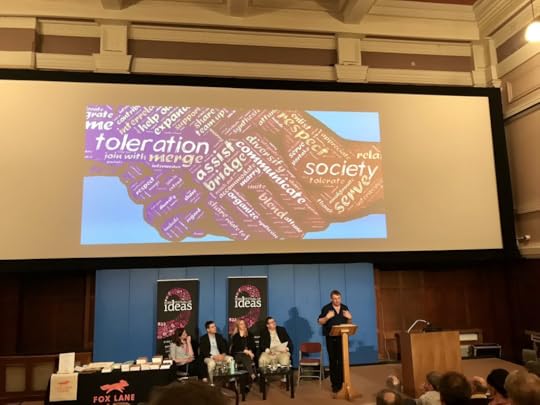
Danny Dorling speaking on toleration – and what happens if we tolerate this.
June 17, 2019
The future is bright and the geography is clear
Brexit has been a disaster with silver linings. The process of trying to leave the EU and the end result could finally jolt the British elite out of their superior complacency, and thereby make the country a fairer and more humane place. We easily forget that on 14 November 2011, David Cameron told the guests at the annual Lord Mayor’s Banquet in London that he had ‘an opportunity to begin to refashion the EU so it better serves this nation’s interests…’
Such arrogance and ignorance!
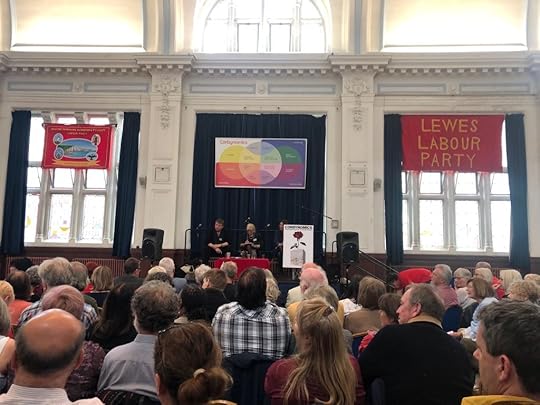
Poly Toynbee and Danny Dorling, Lewes Town Hall
Things fall apart when empires crumble – most severely at the heart of that former empire, in the imperial capital city, and then across the home country. Rediscovery is attempted again and again, until eventually the former heart of the empire becomes reconciled with its new fate. It has always been this way and yet we rarely try to learn much from the fate of past empires. This time, we think, things are different. They are not. This time we are told that we will rebuild the empire. We will not. Things fall apart. It’s just a stage that the British are going to have to get through.
British failings are understandable, because the British have recently ruled over the majority of the known world. Every group of people that has ever done this has taken time to adapt to no longer being superior. And Britain’s leaders are mostly – intellectually or literally – descended from some of the most effective despots the world has ever known. They know how to pull the wool over people’s eyes, lie and hold on to power for as long as they can. The national narcissism required to rule an empire does not dissipate overnight. But the benefit of not growing up under the weight of such sad misconceptions is that we finally see through the men (and they are almost all men) who have so recently been trying so hard to lead us out of Europe.
We will make a prophecy here. They do not yet know it, but what the Brexiteers have actually sped us towards is the final whimper of the old ideal of the British Empire. Before Brexit, they could harbour their fantasies of national superiority – unshackled from the EU, where Britain (or at least they) would be both richer and freer. Now they have called their own bluff and are about to be found out.
The future is bright and the geography is clear. Partly as a result of Brexit, the next generation will soon have a far better idea of the sins, misconceptions and ignorance of their fathers, and hence will be relieved when the UK ceases to be a significant military power. It is for the next generation to make Britain decent, to make Britannia humane, and to consign the empire’s triumphant songs to history. The rest of the world knows what the British are going through and why Britain has an identity crisis. It is just the British, mainly older white people in Britain, who so often still don’t understand it.

Corbynomics: The politics of inequality in the age of Brexit
…
The text above is an extract from “Rule Britannia: from Brexit to the end of Empire” by Sally Tomlinson and Danny Dorling, read out as part of a speech givens shortly after the Peterborough by-election and the European Parliamentary Elections at a Hastings and Rye Constituency Labour Party Public Meeting, Lewes Town Hall, June 8th 2019. Click play below to hear the recording:
Polly Toynbee is speaking first on the saliency of the subject of inequality and how it has been affected as an issue by the Brexit impasse. She is followed by Danny Dorling talking on ‘The Politics of Inequality in the Age of Brexit’, beginning with the extract given up which is from from the chapter: ‘A Land of Hope and Glory?’ in the book ‘Rule Britannia : Brexit and the End of Empire‘. The recording ends with questions from the audience.
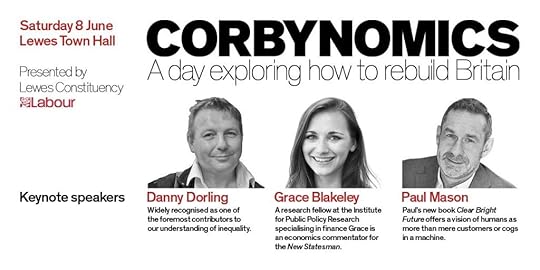
Corbynomics: A day exploring how to rebuild Britain

Saturday 8 June 2019, Lewes Town Hall
June 13, 2019
The best start in life?
In Japan, I once met a man who was starving. He was proud and he was dying. He told me that he had not been able to launch his fishing boat in three months because of the price of fuel. Japan has an acute problem of poverty, but it has low inequality.
Kristin Surak [letter LRB 6 June 2019] suggests that in Japan ‘Abenomics … has shrunk real household in a country that is now one of the most unequal in the OECD. Nearly every country in Europe has a more equal income distribution than Japan, where one in six children grows up in poverty’. One in six is low, and Japan is not one of the most unequal of OECD countries.
The policies of Abe Shinzō do not help Japan, but as Sagiri Kitao and Tomoaki Yamada in their comprehensive report of May 14 2019 explain, ‘ongoing rapid and massive demographic ageing is the driving force of the aggregate trend of inequality’. In all societies people tend to be paid more equally when they are young with disparities being widest between those nearing retirement.
Kitao and Yamada use the National Survey of Family Income and Expenditure (NSFIE) which is released every five years. The latest data will be collected in September, October and November of this year; but only October and November for one-person households. One-person households are now very common in Japan. However, despite their rise, the May 14 2019 report found that in Japan ‘income inequality of households above age 65 has declined sharply since 1980s [and that] this is accounted for by a more comprehensive coverage of the public pension system’. In other words the rise is due to ageing within working ages, not ageing overall.
The OECD comparisons to which Surak refers are based on the Comprehensive Survey of Living Conditions, conducted every three years by the Japanese Ministry of Health and Welfare which are now known to give misleading results in international comparison. The OECD itself explains that for these ‘Another source of official data, the National Survey of Family Income and Expenditure conducted every 5 years by the Ministry of Internal Affairs and Communication, [which] shows a higher median income and lower poverty and inequality…’
A report on the most reliable survey in Japan, as reported on 14 May 2019, finds that ‘Households in the highest quintile receive 1.9 to 2.1 times the average income. The top 1% receive 4.4 to 5.0 times the average. …Unlike in the U.S., where the income grew the fastest among top earners since the late 1980s until the financial crisis of 2007-2008 …, the share of the top earners in Japan remained almost unchanged during the post-bubble period.’
In February 2019 the UK’s ONS reported that the share of household equivalised disposable income received by the richest 1% of individuals in the UK, in the financial year ending 2018 was over 7 times the average and had risen as compared to 2016/2017. The share of the best-off 1% of UK households is much higher than for individuals, much more than twice as high as their 5% take Japan.
On the 14th of May, on the same day that we learnt that inequality in Japan was so much lower than in the UK, the CBBC Newsround programme told children that child poverty was becoming the “new normal” in many parts of Great Britain and that around 1 in 3 children were now living in poverty, set to rise to 37% by 2023-24. You have to go back to the era when a young John Craven was presenting Newsround to find child poverty figures as low in the UK as they are today in Japan. A government spokesman told Newsround that the authorities in the UK now ‘provide free school meals to more than one million of the country’s most disadvantaged children to ensure every child has the best start in life’. Free food for the few is not the ‘best start in life’.
Last month, just before Philip Alston, the United Nations rapporteur on extreme poverty released his report, Human Rights watch revealed that ‘pupils at Orchard Meadow and Pegasus primaries schools in the Blackbird Leys area of Oxford are among those receiving leftover fruit, vegetables, bread and dried goods from supermarkets and wholesalers delivered by the Oxford Food Bank’. The budgets of those two Oxford schools are no longer sufficient to pay for free school meals, so both now use food banks.
The starving old fisherman man I met by the docks will now be dead; but the Japanese, thanks to their low level of income inequality, are today amongst the longest lived people in the world. In contrast, life expectancy in the UK is low for Europe, and falling. Twice as many children are growing up in poverty in the UK as in Japan, and that is rising. Unless we act, a child growing up in Oxford today is more likely to die homeless in the city than to attend one of its two universities – but that is the least of their worries.
Earlier this year British social scientists estimated that the proportion of adults starving in the UK was around 3%. They also found that between 2004 and 2016 food insecurity among the least well off almost doubled. In Japan 98.4% of elementary school children receive a free school lunch. It is just seen as lunch. Despite Abe Shinzō, children in Japan still have the best start in life.
Danny Dorling,
Oxford.
For PDF of the published shorter version of this letter in the LRB and a list of sources click here.

『東海道江尻田子の浦略図』 – Tōkaidō Ejiri tago-no-ura Sea coast at Tago, near Ejiri – sketch (1830)
June 11, 2019
Global trends over time – apart from climate, is almost everything else about to get better?
Some ideas to share with current London-based Social Science PhD students. We may be slowing down as a species. And, if so, we may not just be slowing down in terms of how many children we have, but in almost everything else we do other than the rise in global temperatures we live with. If this is true – what does it mean? And what measurements suggest it is true? Or is it just an artefact of measuring almost any aspect of our lives – that not long after we begin to measure something, the rate of change in that something appears to decelerate?
Danny Dorling speaking at the Economic and Social research Council (ESRC) London Doctoral Training programme (DTP)s’ Social Science Research Day: Social science to serve society: Communicating research to make an impact, Friends’ Meeting House, Euston, London, June 7th 2019.

Are we now slowing down?
May 30, 2019
Letter sent to the Financial Times Newspaper (London), Thursday May 30th 2019
We believe there are issues of concern over the governance of the UK’s largest private pension, the Universities Superannuation Scheme (USS).
The Trustees have a fiduciary duty to act in the interests of scheme members. A board member, with expertise in statistics, raised serious concerns about the quality of the evidence and analysis being presented to the board. How were these concerns addressed and investigated by the board of Trustees? Did the rest of the Trustees investigate these claims adequately and act in the interests of scheme members?
If the Trustees or the USS executive are unable to act in the interests of scheme members, then they should resign. If the employer and union appointed Trustees are failing to act in the interests of scheme members, then it is the responsibility of UUK (via the Employers Pensions Forum) and of the UCU to replace the Trustees.
We believe the conduct of USS valuation over the last two years has brought the scheme into disrepute. An enquiry is urgently needed to obtain the necessary information to assess the USS’s claims, review the conduct of the USS executive, Trustees and the Pensions Regulator, and ultimately to rebuild members’ and employers’ trust and confidence in the scheme. It would be appropriate for a select committee of parliament to investigate.
Finally, we would like to thank Prof Hutton for her exceptional work as Trustee.
Signed
Dr Alison Cameron (Bangor University), Dr Neil Davies (University of Bristol), Professor Danny Dorling (University of Oxford), Professor Bianca de Stavola (University College London), Dr Natasha Howard (London School of Hygiene and Tropical Medicine), Professor Sir David Spiegelhalter (Winton Centre for Risk and Evidence Communication, University of Cambridge) and 1,012 others:
Aberystwyth University
Dr Christopher Phillips
Aston University
Dr Gary Fooks
Bangor University
Prof Vian Bakir
Dr Annika Beelitz
Dr Patricia Bestelmeyer
Dr Charles Bishop
Mr Julian Brasington
Dr Alison Cameron
Dr David Carey
Prof Shanti Chakravarty
Dr Gwynfor Davies
Dr Mihela Erjavec
Dr Jonathan Ervine
Dr Richard Holland
Mr Kevin Hughes
Prof Stuart Jenkins
Dr Dyfrig Jones
Dr Karin Koehler
Dr Gavin Lawrence
Prof James McDonald
Prof Andrew McStay
Prof Doris Merkl-Davies
Dr Helena Miguelez-Carballeira
Dr Paul Mullins
Dr Marco Pelliccia
Dr Sarah Pogoda
Mr Huw Powell
Ms Katie Roberts
Dr Gwyndaf Roberts
Dr Anne-Marie Smith
Dr Emily Tyler
Mr Richard Wigzell
Mr Gwion Williams
Ms Joanna Wright
Dr Wolfgang Wüster
Dr Fiona Zinovieff
Ms Wanda Zyborska
Birkbeck, University of London
Prof Felicity Callard
Mr Paul Rigg
Bournemouth University
Ms Marian Mayer
Bournville College
Mrs Nita Sanghera
Brunel University London
Dr Josh Bowsher
Dr Javier Coto
Dr Gareth Dale
Dr Fotios Drenos
Dr Stanley Gaines
Dr Nick Hubble
Dr Paul Kyberd
Dr Andrew Parton
Dr Daniel Roberts
Dr Bianca de Haan
Dr Stanislao Lauria
Cardiff University
Dr Tilmann Altenberg
Dr Michael Arribas-Ayllon
Dr Christopher Bear
Dr Leandro Beltrachini
Dr Roser Beneito-Montagut
Prof Jacky Boivin
Dr Lloyd Bowen
Dr Finn Bowring
Prof Marc Buehner
Dr Andreas Buerki
Prof Chris Bundy
Prof Sin Yi Cheung
Prof Harry Collins
Dr Emily Cox
Prof John Culling
Dr Chris Dillingham
Prof Pete Dorey
Prof Dominic Dwyer
Prof Matthias Eberl
Dr Adam Edwards
Dr Fergal Ennis
Prof Jonathan Erichsen
Dr Adam Errington
Dr Lisa Evans
Prof Deborah Fodter
Dr William Ford
Prof Tom Freeman
Dr Chiara Gambi
Dr Sofia Gameiro
Dr Jonathan Gillard
Dr Marcus Gomes
Dr Jacques Grange
Prof Anna Grear
Dr Katy Greenland
Dr Matthias Gruber
Dr Craig Gurney
Dr Rachel Hurdley
Dr Yi-Jhong Han
Prof Michael Handford
Ms Kirsty Harding
Prof Marco Hauptmeier
Dr Lydia Hayes
Dr Rachel Herrmann
Mrs Andrea Higgins
Dr Alexandra Hillman
Dr Daniel Hobley
Dr Nick Hodgin
Dr Jenny Hoolachan
Prof Ian Humphreys
Dr Iain Hutcheson
Dr Anthony Ince
Dr Katy Jones
Dr Raya Jones
Dr Samantha Jones
Dr Andrew Kerr
Prof Paul Kinnersley
Dr Branko Latinkic
Dr Samuli Leppälä
Prof Penny Lewis
Dr Qinyun Li
Prof Caroline Lloyd
Dr Sonia Lopez de Quinto
Prof Bill Macken
Dr Richard Madgwick
Dr Leah Maizey
Dr Guy Major
Dr Bharat Malkani
Prof Antony Manstead
Mr Jonathan Marsh
Dr Alex McAuley
Dr David Mcgonigle
Dr Renata Medeiros
Prof Mara Miele
Dr Candice Morey
Prof Joseph O’Mahoney
Prof Ken Peattie
Mr Neil Penry
Dr Ludivine Petetin
Prof Nicola Phillips
Prof Wouter Poortinga
Dr Sergey Popov
Prof Nicky Priaulx
Prof Julie Price
Dr Travis Proulx
Mr Abyd Quinn Aziz
Prof Michael Reed
Dr Justyn Regini
Mr Adrian Rixon
Ms Laura Roach
Prof Frank Sengpiel
Prof Manuel Souto-Otero
Dr Steven Stanley
Dr Richard Stanton
Prof Ceri Sullivan
Dr Christoph Teufel
Dr Gareth Thomas
Dr Kerrie Thomas
Dr Rob Thomas
Dr Jenny Townhill
Dr Ross Vanderwert
Prof Mike Wallace
Prof Victoria Wass
Dr Martin Weinel
Prof Keith Whitfield
Prof James Whitley
Dr Andy Williams
Prof Matthew Williams
Mrs Keren Williamson
Dr Woon Wong
Dr Fiona Wood
Prof Alison Wray
Prof Marianne van den Bree
Dr Job van der Schalk
Dr Elisabeth von dem Hagen
Cranfield University
Ms Shannon Searle
Durham University
Dr Ilan Baron
Dr Duncan Connors
Dr Stefano Cremonesi
Dr Dan Lawrence
Dr Siobhan McGrath
Prof Joe Painter
Dr Leslie Reinhorn
Dr Thomas Renstrom
Prof Riccardo Scarpa
Dr Sara Uckelman
Edinburgh Napier University
Dr Sally Brown
Goldsmiths, University of London
Dr Daisy Asquith
Ms Marian Carty
Prof Aeron Davis
Dr Maxime Desmarais-Tremblay
Prof Natalie Fenton
Prof Des Freedman
Prof Rosalyn George
Ms Mary Claire Halvorson
Dr Gholam Khiabany
Dr Theo Kindynis
Prof Caroline Knowles
Ms Linda Lewis
Dr Suhail Malik
Ms Chloe Nast
Mr Joe Newman
Prof Alan Pickering
Ms Maggie Pitfield
Dr Elizabeth Reed
Mr Gary Riley-Jones
Prof Marsha Rosengarten
Prof Evelyn Ruppert
Dr William Viney
Helmholtz Zentrum Geesthacht
Dr Paul Bowyer
Heriot-Watt University
Sarah Joss
Dr James Richards
Imperial College London
Prof Martin Buck
Dr Ben Calderhead
Prof Margaret Chambers
Dr David Clements
Prof Anne Dell
Prof Fay Dowker
Dr Andrew Edwards
Dr Valerie Good
Dr Ruth Herd
Mr Stefan Hoyle
Prof Mark Isalan
Prof Paul Lickiss
Dr Colin McClure
Prof Jonathan Mestel
Dr Robert Nurnberg
Ms Janette Shiel
Mr Roddy Slorach
Institute of Development Studies
Dr Philip Mader
Dr Gauthier Marchais
Dr Alex Shankland
Keele University
Dr Ben Anderson
Ms Robin Bell
Dr Rebecca Bowler
Prof Matthew Brannan
Dr Rachel Bright
Dr Joseph Brooks
Mr Michael Brough
Dr Philip Catney
Dr Jon Cope
Mrs Julie Douglas
Prof Rajmil Fischman
Dr Peter Fletcher
Miss Dianne Foulkes
Dr Yossi Nehushtan
Dr Alexandre Nobajas
Dr Jane Parish
Dr Mario Prost
Dr Rebecca Richards
Dr A Rutherford
Dr Shalini Sharma
Dr Shiva Sikdar
Dr Richard Stephens
Hitomi Tobe
Dr Sorcha Ui Chonnachtaigh
Dr Bernard Zarychta
King’s College London
Ms Francesca Allfrey
Prof Chris Berry
Dr Clare Birchall
Dr Andrew Brooks
Mrs Joan Bryan
Dr Ferdinand Eibl
Dr Jane Elliott
Prof Ziad Elmarsafy
Prof Paul Gilroy
Dr Andy Grant
Dr Ye Liu
Dr Anna Maerker
Dr Stan Papoulias
Dr Michelle Pentecost
Dr Rebecca Saunders
Prof David Treece
Prof David Edgerton
Lancaster University
Mr Sunil Banga
Dr Richard Budd
Mr Iain Fothergill
Dr Julie Hearn
Prof Andrey Lazarev
Dr Nils Markusson
Dr Hannah Morgan
Prof Maggie Mort
Dr Jacob Phelps
Prof Bev Skeggs
Prof Imogen Tyler
London School of Economics and Political Science
Dr Luna Glucksberg
Mr Neil Stewart
London School of Hygiene and Tropical Medicine
Prof Clare Chandler
Dr Ben Cislaghi
Dr Natasha Howard
Dr Eleanor Hutchinson
Dr Shelley Lees
Dr Matthew Quaife
Loughborough University
Dr Nick Freeman
Dr Thomas Swann
Dr Clive Trusson
Manchester Metropolitan University
Dr James Pritchett
NHS Health Scotland
Dr Jon Minton
Newcastle University
Mr Phillip Archer
Dr Jaume Bacardit
Dr Bruce Baker
Mr Robin Booth
Dr Clare Butler
Prof Kate Chedgzoy
Mr Dave Churchley
Mr Graham Collins
Mr Jeffrey Craig
Dr Jan Dobbernack
Dr Michael Dritschel
Dr Gail Edwards
Dr Andrew Fletcher
Dr Stacy Gillis
Mrs Carol Gordon
Ms Helen Griffiths
Dr Rachel Hammersley
Dr Caspar Hewett
Prof Robert Hirt
Dr Seamus Holden
Dr Nick Jakubovics
Prof Al James
Dr Domhnall Jennings
Dr Craig Jones
Dr Joshua Jowitt
Prof Richard Lewis
Prof Neil Perkins
Dr Terrence Ratcliffe
Dr Andrea Rehberg
Mr William Salmon
Dr Luke Smith
Dr Joanne Smith Finley
Dr David Stewart
Prof David Thwaites
Prof Matthias Trost
Dr Simon Whitehall
None
Dr Conor Cradden
Mr Martin O’Connor
Open University
Dr Caitlin Adams
Dr Elton Barker
Mr Laurence Breeze
Prof Jo Brewis
Prof Steven Brown
Dr Gill Clough
Mrs Anna Comas-Quinn
Dr Judith Ekins
Ms Alison Higgs
Dr Matthew Howard
Ms Lesley Kane
Mr David Knowles
Ms Maria McCrea
Mr Tim Parry
Mr Kevin Pascoe
Mr John Peters
Dr Anita Pilgrim
Mr Kit Power
Mr Jeremy Roebuck
Dr Chris A. Williams
Dr Caroline Clarke
Oxford University
Prof Jocelyn Alexander
Dr Michael Biggs
Dr Rory Bowden
Prof Julia Bray
Prof Richard Caplan
Prof Patricia Clavin
Dr Inge Daniels
Dr Julien Devriendt
Prof Danny Dorling
Mx Alexander Dutton
Prof Jaś Elsner
Prof Fabian Essler
Dr Josh Firth
Prof Barbara Harriss-White
Ms Eli Harriss
Prof Dan Healey
Dr Michael Holmes
Prof Todd Huffman
Mr Jaya John John
Prof Aris Katzourakis
Ms Svenja Kunze
Prof Elizabeth Eva Leach
Prof Derek McCormack
Dr Karen Margrethe Nielsen
Prof Mohamed-Salah Omri
Dr Felix Parra Diaz
Prof Armin Reichold
Prof Gonzalo Rodriguez-Pereyra
Prof Nicholas Stargardt
Prof Jonny Steinberg
Dr Nikita Sud
Prof Diego Sánchez-Ancochea
Dr Georg Viehhauser
Dr Sam Vinko
Mr Roy Wastie
Dr Daniel Weatherill
Prof Tony Weidberg
Prof Stuart West
Prof Jonathan Wolff
Prof Anton van der Merwe
Queen Mary University of London
Mr Christian Garland
Dr Stuart Grieve
Retired
Prof Colin Price
Richmond, the American Int University in London
Dr Martin Brown
Royal Holloway University of London
Dr Stephanos Anastasiadis
Mr Gary Boorman
Prof Rachel Beckles Willson
Prof Gregory Chockler
Prof Gregory Claeys
Dr Douglas Cowie
Dr Rhys Davies
Mr Adam Ganz
Dr Simon George
Dr Liz Gloyn
Prof Helen Graham
Prof Gregory Gutin
Prof J. P. E. Harper-Scott
Prof Judith Hawley
Mr Chris Howorth
Dr Rebecca Jinks
Dr Will Jones
Prof Barry Langford
Dr Enrique Lòpez-Juez
Dr Ellie Mackin Roberts
Prof Mandy Merck
Dr Lidia Merás
Dr Oli Mould
Dr Jennifer Neville
Ms Gail Pearce
Ms Fiona Prendergast
Dr Rudiger Riesch
Prof Lene Rubinstein
Prof Elizabeth Schafer
Dr Hugh Shanahan
Mrs Pat Simpson
Prof Anne Varty
Dr Magnus Wahlström
Mr Nathan Whittaker
SOAS, University of London
Dr Feyzi Ismail
Sussex University
Dr Max Jensen
Prof Ben Selwyn
Swansea University
Dr Will Allen
Dr Alex Latham-Gambi
Dr Sietse Los
The University of Sheffield
Mr Jamie Callaghan
Prof Paul Latreille
Ulster University
Ms Grainne Dooher
Mr Norman Hagan
Ms Andrea Jones
Dr Greg Kelly
Dr Laura McKeown
Dr Linda Moore
Dr Aisling O’Beirn
Mr Mark Poulter
Mrs Clare Rainey
Mr Raymond Robinson
Ms Cynthia Rosalind Rogers
Dr May Stinson
Dr James Ward
Mrs Joan Kennedy-Lundy
University College London
Mr Mark Bailey
Mr Leonardo Bevilacqua
Mr Robert Blizard
Prof Martin Bobak
Dr Katherine Bowers
Dr Alun Coker
Prof Tim Cole
Prof Bianca De Stavola
Dr Adam Dennett
Prof Michael Edwards
Mrs Mariuccia Fiorino
Dr Martin Fry
Prof Eric Gordy
Prof Muki Haklay
Dr Rodolfo Hermans
Dr Lily Okalani Kahn
Mr Scott Keir
Dr Vasileios Lampos
Dr Peter Martin
Prof Mark Maslin
Dr Saladin Meckled-Garcia
Dr Robert Mok
Ms Sibylle Nalezinski
Prof Ad Neeleman
Dr Mark Newman
Dr Ben Page
Prof Hynek Pikhart
Prof Eleanor Robson
Ms Rena Sherman
Dr Sherrill Stroschein
Prof Alice Sullivan
Dr N. Vittal
Dr Bella Vivat
Mr Sean Wallis
Dr Sarah Young
University of Aberdeen
Prof Patience Schell
Dr harriet carroll
University of Bath
Dr Yankı Keles Atay
Dr Emma Carmel
Prof James Davenport
Prof Carmen Domene
Dr Emma Emanuelsson
Prof Peter Hall
Mr Mesar Hameed
Dr Jason Hart
Dr Kostas Iatridis
Dr Rana Jawad
Dr Martin Levere
Prof Hartmut Logemann
Dr Izaro Lopez Garcia
Dr Peter Manning
Dr Jesus Martinez Garcia
Dr David Moon
Dr Theo Papadopoulos
Dr Michael Proulx
Dr Justin Rogers
Dr Patricia Schady
Dr Peter Sloan
Mrs Cynthia Spencer
Ms Diana Teggi
Dr Philip Tomlinson
Dr Esther Walton
University of Birmingham
Dr Stephen Bates
Miss Ioana Cerasella Chis
Dr Tom Cutterham
Dr Rosie Day
Dr Alan Greene
Dr Nick Hardy
Mr Nicholas Hunter
Dr William McKinnon
Prof Muireann Quigley
Mr Kim Sein
Mr Joseph Ward
University of Bristol
Dr Ana Abdala Sheikh
Ms Tessa Alexander
Dr Shelley Allen
Prof Bridget Anderson
Prof Richard Apps
Dr Miranda Armstrong
Mrs Valerie Aspin
Dr Marton Balazs
Prof Zafar Bashir
Prof Paul Bates
Mrs Sarah Blackmore
Prof Peter Blair
Mr Andy Boyd
Dr Grace Brockington
Dr Jonathan Brooks
Dr Keith Brown
Dr Ian Bull
Dr Steve Bullock
Dr Katy Burgess
Dr Doretta Caramaschi
Prof Havi Carel
Dr David Carslake
Prof Alan Champneys
Dr Haeran Cho
Dr Anthi Chondrogianni
Dr Stephen Clark
Mr Alex Clarke
Mr Martin Clarkson Webb
Dr Ruth Coates
Dr Christopher Coath
Ms Melissa Cole
Mr Steve Cole
Prof Stuart Cooper
Dr Sara Correia Carreira
Dr Michael Costen
Mr Gilles Couzin
Mr Nick Crabb
Mr Mike Crawford
Prof Markus Damian
Dr Robin Damion
Dr Brian Dangerfield
Mr Neil Davey
Prof George Davey Smith
Dr Anna Davies
Dr Neil Davies
Ms Sara Davies
Dr Steffan Davies
Dr Julio Decker
Dr Jane Dennis
Dr Laura Dickinson
Dr Padraig Dixon
Miss Catherine Downs
Prof Andrew Dowsey
Dr Marianna Dudley
Dr Julie Dunne
Prof Julian Eastoe
Prof Kerstin Eder
Mrs Jocelyn Egginton
Dr Hannah Elliott
Prof Tim Elliott
Mr Sean Fabri
Dr Pete Falconer
Prof Gene Feder
Miss Jane Fitzwalter
Prof Peter Flach
Prof John Foot
Dr Ian Foster
Mr Kit Fotheringham
Dr Tim Fowler
Dr Albertine Fox
Dr Abigail Fraser
Dr Sylvain Friederich
Dr Simon Gamble
Dr Ayalvadi Ganesh
Dr Kathryn Garner
Ms Daisy Gaunt
Dr Patricia Gaya
Dr Joe Gerlach
Prof Rupert Gethin
Mr Joseph Gliddon
Dr Ruth Glynn
Prof David Gordon
Prof Jo Gottsmann
Dr Tamara Grava
Prof Peter Green
Dr Gareth Griffith
Mr Mike Hackett
Dr Mark Hagen
Prof Edward Hall
Dr Kelly Hares
Dr Anna Havinga
Dr Philip Haycock
Prof Eric Herring
Mr Martin Hewitt
Mrs Karen Ho
Prof Andrew Hogg
Dr Elizabeth Holcombe
Mrs Patricia Holley
Mrs Tracey Hooper
Dr Nicholas Howden
Dr Laura Howe
Ms Kerry Humphries
Dr Suzanne Ingle
Dr Christos Ioannou
Dr Mark Irvine
Dr Stephen James
Mr Dave Jarman
Dr Chathuni Jayathilaka
Dr Laura Johnson
Prof Ron Johnston
Dr Hayley Jones
Dr Rebecca Kandiyali
Dr Nina Kazanina
Prof Patrick Kehoe
Dr Christopher Kent
Dr Claire Knight
Prof Toby Knowles
Dr Jason Konek
Dr Adriana Korczak
Dr Katja Krebs
Prof James Ladyman
Dr Rita Langer
Dr Beki Langford
Dr Jake Langham
Ms Lucy Langley-Palmer
Dr Dominic Lash
Prof Deborah A Lawlor
Dr Daniel Lawson
Dr Colin Lazarus
Dr Ute Leonards
Prof Tanniemola Liverpool
Dr Oliver Lord
Ms Hannah Lowery
Prof Daniel Lunt
Dr John Lyons
Dr Julie MacLeavy
Dr Stephanie MacNeill
Ms Katie Mack
Dr John Mackay
Prof John Macleod
Prof Heidy Mader
Miss Christina Maunder
Prof Robert Mayhew
Dr Olivia Maynard
Dr Lee McConnell
Mrs Laura McCormick
Dr Sheelagh McGuinness
Dr John McTague
Prof Chris Metcalfe
Prof Nicoletta Momigliano
Dr Andrew Moore
Dr Karen Morgan
Dr Rhys Morris
Dr Tim Morris
Dr Jule Mulder
Prof Marcus Munafo
Prof Stuart Mundell
Miriam Munoyerro
Prof George Mylonakis
Dr Bernhard Naafs
Prof Guy Nason
Ms Naomi Nile
Dr Angela Nobbs
Prof Tonia Novitz
Dr Matt O’Donnell
Prof Catherine O’Rawe
Prof Samir Okasha
Dr Jennifer Palmer
Dr Angeliki Papadaki
Prof Martin Parker
Dr Richard Parker
Dr Rupert Payne
Dr Columba Peoples
Dr Nieves Perez-Solorzano
Dr Claire Perks
Dr Maud Perrier
Dr William Pooley
Dr Dorothy Price
Dr Juliana Redondo
Prof Caroline Relton
Dr David Richards
Mrs Hollie Richards
Prof Jeremy Rickard
Dr Alison Rivett
Dr Elizabeth Robles
Mr Dave Rogers
Dr Jane Rooney
Dr Angela Rowe
Dr Albert Sanchez-Graells
Dr Susanne Schindler
Prof Daniela Schmidt
Prof Andreas Schonle
Mrs Hannah Schubert
Prof Nick Scott-Samuel
Mr Philip Sellen
Dr Richard Sessions
Dr Gemma Sharp
Ann Singleton
Dr Poppy Statham
Dr Katarzyna Stawarz
Mr Sam Story
Dr Steven Street
Prof Andrew Sturdy
Dr Matthew Suderman
Dr Brian Sullivan
Dr Eileen Sutton
Dr Jon Symonds
Dr Peter Tammes
Dr Hannah Tayler
Dr Caroline Taylor
Dr Alison Teyhan
Mr Antony Theobald
Dr Kyla Thomas
Mrs Laura Thomas
Dr Joanna Thorn
Dr Rowan Tomlinson
Mr Patrick Townsend
Dr David Troy
Dr Theo Tryfonas
Dr David Turk
Dr Nicholas Turner
Mrs Fabienne Vailes
Prof Paul Valdes
Dr Elspeth Van Veeren
Prof Charlotte Villiers
Prof Thorsten Wagener
Dr Josephine Walker
Ms Emma Weeks
Prof Jutta Weldes
Dr Helen Whelton
Dr Karoline Wiesner
Dr Keir Williams
Dr Sam Williamson
Dr Caroline Wilson
Ms Ruth Winter
Dr Julia Wirtz
Dr Caroline Wright
Dr Robert Yates
Dr Paul Yousefi
Dr Vanda Zajko
Dr Luisa Zuccolo
Dr Diana dos Santos Ferreira
Dr Isobel Lloyd
Dr Alice Malpass
University of Cambridge
Mr David Cheesman
Mr David Gibson
Prof Raymond Goldstein
Dr Midori Harris
Dr Samuel James
Dr Anna Judson
Mrs Bin Liu
Dr Emma Loftus
Dr Pedro Ramos Pinto
Prof David Spiegelhalter
Prof Simon Szreter
Dr Lucy Wrapson
Dr Waseem Yaqoob
University of Chester
Prof Alana Vincent
University of Chichester
Mr Dermot Feenan
University of Dundee
Dr Ian Ellis
Prof Kurt Mills
Dr Carlo Morelli
Mr Andrew Swiffin
Mr Ian Swift
Dr Timothy Wilson
University of East Anglia
Dr Tharin Blumenschein
Dr Mark Hobbs
Dr Georgia Philip
Dr Joe Purshouse
University of Edinburgh
Dr Ian Butler
Mr Grant Buttars
Prof Douglas Cairns
Dr Jacob Copeman
Dr Alexander Corbishley
Dr Andrew Crawford
Dr Isabel Fletcher
Dr Hugo Gorringe
Mr Michael Holmes
Dr Andy Hom
Ms Angi Lamb
Prof Diana Paton
Dr Kaveri Qureshi
Dr Kanchana Ruwanpura
Dr Suzanne Trill
Dr Sophia Woodman
Mr Bob Goupillot
University of Essex
Dr Ewen Speed
University of Exeter
Prof Clive Barnett
Dr Lara Choksey
Prof Ian Cook
Prof Gail Davies
Dr James Dyke
Dr Mike Finn
Prof Kate Fisher
Dr Sam Kinsley
Prof Melissa Percival
Dr Nicola Thomas
Prof John Wylie
University of Glasgow
Mr Christopher Boyd
Prof Louise Matthews
Dr Neil McDonnell
Dr Damien McGrouther
Dr Theo Pepler
Dr Richard Reeve
Dr Rachel Smith
Dr Adrian Streete
University of Greenwich
Dr Vanessa Taylor
University of Hull
Dr Philip Langley
University of Kent
Dr Heejung Chung
Prof Matthew Goodwin
Dr Toni Haastrup
Dr Claire Jones
University of Leeds
Ms Vicky Blake
Dr Matthew Cole
Dr Nicola Gambino
Prof Mark Gilthorpe
Mr Tim Goodall
Dr Ian Greenwood
Prof Jane Holgate
Dr Jo Ingold
Dr Carol Kearney
Dr Vladimir Kisil
Prof Simon Lewis
Dr Lata Narayanaswamy
Ms Caroline Neave
Dr Brendon Nicholls
Ms Ben Plumpton
Prof Megan Povey
Dr Craig Purshouse
Dr Alan Roe
Prof Ingrid Sharp
Dr Gary Slater
Prof Martin Speight
Dr James Stark
Dr David Steenson
Prof Charles Taylor
Dr Mark Taylor-Batty
Dr Peter Tennant
Ms Georgia Testa
Prof Steven Tobias
Prof Pekka Vayrynen
Dr Chloe Wallace
Prof Carmen Molina-Paris
University of Leicester
Prof Gavin Brown
Dr Toby Lincoln
Prof Susan Page
Dr Briony Pulford
Dr Patrick White
University of Lincoln
Dr Leon Rocha
University of Liverpool
Dr Colin Bannard
Dr Fran Darlington-Pollock
Prof Fernand Gobet
Dr Alan Southern
Dr Sujitha Subramanian
Prof Michael Clague
University of Manchester
Prof Stuart Allan
Ms Lynn Cullimore
Dr Kevin Gillan
Prof Megan Jobsin
Dr Kamie Kitmitto
Dr Douglas Lowe
Dr Eric Lybeck
Dr Joseph Pitt
Dr Madeleine Reeves
Prof Dan Rigby
Prof David Schultz
Prof Ludi Simpson
Dr Miriam Smith
Dr James Sumner
Dr Romain Tartese
Dr Tom Tunstall Allcock
Prof Peter Wade
Prof Roy Wogelius
Dr Alexia Yates
Dr Natalie Zacek
University of Nottingham
Prof Christopher Conselice
Dr Thom Davies
Prof Mark Fromhold
Dr Nicholas Girkin
Prof John Holmwood
Dr Rob Lutton
Dr Bram Mertens
Dr Jane Nolan
Dr Beatriz Olmos Sanchez
Dr Will Paterson
Dr Stuart Reeves
Dr Neil Sinclair
Prof Richard Wilkinson
University of Reading
Dr Joanna Clark
Dr Hilary Geoghegan
Mrs Deepa Govindarajan Driver
University of Sheffield
Mr Ian Belton
Prof Colin Bingle
Prof Matthew Gilbert
Dr Alvaro Martinez-Perez
Ms Jess Meacham
Dr Chris Millard
Dr Daragh O’Reilly
Miss Rachel Staddon
Dr Traci Walker
Dr Meredith Warren
University of Southampton
Dr Remy Ambuhl
Prof Peter Clarke
Dr Caroline Childs
Dr Andrew Chipperfield
Prof Mark Cornwall
Dr Hormoz Ebrahimnejad
Dr Christopher Fuller
Prof Neil Gregor
Dr Andy King
Mr Nicholas Kingwell
Prof Tony Kushner
Dr Claire Le Foll
Prof Dan Levene
Dr Reuben Pengelly
Dr Joan Tumblety
University of St Andrews
Prof Saleem Bhatti
Prof Ian Gent
Dr Tristan Henderson
Dr Alexander Konovalov
Dr PJ Lennon
Mr Charles Lovatt
Dr Akira O’Connor
University of Strathclyde
Dr Neil McGarvey
Dr Brian McNeil
Dr David Pritchard
University of Surrey
Dr Tom Hall
Dr Afrodita Marcu
University of Sussex
Dr Benedict Allbrooke
Dr Anne-Marie Angelo
Dr Laia Becares
Dr Liam Berriman
Prof G. K. Bhambra
Prof Christopher Chatwin
Dr Andrew Chitty
Prof John Drury
Dr Matthew Evans
Dr Jackie Grant
Prof Jeffrey Hartnell
Dr Mark Hindmarsh
Dr Kate Howland
Dr Omar Lakkis
Mr Barry Luckock
Dr John Maule
Prof Michael Melgaard
Dr Joanna Pawlik
Dr Simon Peeters
Dr Samuel Solomon
Dr Arabella Stanger
Prof Lindsay Stirton
Dr Ruth Stirton
Catherine Tonge
Dr Kiron Ward
Dr Simon Williams
Mr Paul Ewart
University of Wales
Huw Davies
Mr Andrew Hawke
University of Warwick
Dr Adam Johansen
Dr Jere Koskela
Prof Ranko Lazic
Prof Dennis Leech
Prof David Mond
Dr Murray Pollock
Dr Saul Schleimer
University of Winchester
Dr Marika Rose
University of Wolverhampton
Prof Andrew Perchard
University of York
Dr Isra Black
Prof Lawrence Black
Dr Kate Brown
Dr Liam Clegg
Prof Bill Cooke
Dr Jacob Eriksson
Dr Kevin Farnsworth
Prof Paul Foulkes
Dr Adam Fusco
Dr Harriet Gray
Dr David Huyssen
Dr Zoë Irving
Dr Tom Johnson
Dr Ingrid Kvangraven
Dr Nicole Lindstrom
Dr Gerard McCann
Dr Paul McFadden
Dr Colleen Morgan
Dr Jeremy Moulton
Prof Richard Nolan
Dr Simon Parker
Prof Kate Pickett
Dr Kelly Redeker
Dr Chris Renwick
Dr Enrico Reuter
Dr Antonios Roumpakis
Dr Gonzalo Vallejo Fernandez
Dr Sara Van Goozen
Dr Pragya Vohra
Dr Alison Wallace
Dr Sarah West
Dr Sam Wetherell
May 28, 2019
How the end of Britain’s empire helped Leave to its initial 2016 victory
The collapse of Britain’s empire in the decades after World War II was followed by a huge growth and then persistence of extreme economic inequality. Britain’s relative economic decline occurred in tandem with the loss of almost all of its remaining colonies in the 1970s and the economic benefit they had provided. The British thought that joining the European Economic Community in 1973 could replace this loss. It didn’t, because the European relationship was mutual, rather than exploitative.
At the same time, within Britain, inequality began to rise. Income inequalities rose from being among the lowest in Europe in the 1970s to being the highest of all 28 European Union member states by 2015, the year before the EU referendum. And the UK’s income inequality also saw the greatest rise during this period between 1976 and 2016.
Great inequality has damaged the lives of the majority of middle-class Conservative and UK Independence Party (UKIP) voters who live in the south of England. It damaged their lives because it hurt so many of their children and grandchildren’s life chances. Whereas their generation, when young adults, could more easily secure permanent housing, start a family, hold down a steady job and – if they were to secure a place – attend university for free, it’s primarily because of rising inequality that the next generations in England could not so very often do so.
In the local elections of May 2019 the Conservative party lost 1330 seats, Labour lost 84. In the European Parliamentary elections that took place later that same month, the loses for the Conservatives were even more devastating. When they are compared to the most recent, 2014, European election results the combined number of seats won by the Conservatives+UKIP+The Brexit Party in Great Britain fell by ten. The number of seats won by Labour fell by ten. The number won by the Liberals, Green and other minor parties rose by twenty. Pro-remain parties did much better than the pro-Brexit bloc, and better than Labour (which was pro-Remain but ambiguous).
In Northern Ireland the picture was similar. A unionist pro-Leave candidate who was allied with the European mainland far-right lost his seat. That seat was won by a pro-Remain candidate of the Alliance party. Across the UK as a whole, the drop in far-right members of the European Parliament totalled eleven MEPs. This was the largest fall in far-right voting ever to have occurred at any European election in the UK since the first was held in 1979. Here far-right is defined as being in a political party aligned to groups that are to the right of the main (EPP) European Conservative bloc.
‘Leave’ no longer has the support it enjoyed in June 2016. This is what happens at the end of empire. Eventually the penny drops. In May 2019 the tide turned away from Leave. But that raises the questions of how did the situation get to this, why now and why here in Britain and not in any other state of the EU?
Please click here for the on-line version of the full article this is an edited extract from, including all references, and a pdf of the article including all comments (comments which often help to make the case for there being much ignorance of the role empire has played). And click ‘play’ below if you are interested in how these events are understood when the decline of that old Empire is put in the foreground:
Audio recording of Sally Tomlinson and Danny Dorling, speaking about their new book: Rule Britannia: Brexit and the end of Empire, Hay Festival, Hay on Wye, 25th May 2019.
May 26, 2019
Hay Festival 25th May 2019 – Rule Britannia
Sally Tomlinson and Danny Dorling speaking at the Hay Festival, on the Oxfam Moot Stage, May 25th 2019 – the day after Theresa May resigned.
How many more Prime Ministers will Brexit end? And when will the British finally wake up to the dawn of the day when they realise the Empire is over, that they are special no more, and that it is time to become normal?
A talk about the book: Rule Britannia: From Brexit to the end of Empire, first published January 15th 2019

Danny Dorling and Sally Tomlinson speaking at the Hay Festival 25th May 2019
May 24, 2019
On the 200th birthday of Queen Victoria: Theresa May resigned
How did it come to this? What is happening to Britain and why? Why now? Why such an enormous mess?
A few ideas are given in this article written to celebrate Empire Day May 24th 2019.
The article explains that the song to sing today goes as follows:
Brightly, brightly, sun of spring upon this happy day
Shine upon us as we sing this 24th of May
Shine upon our brothers too,
Far across the ocean blue,
As we raise our song of praise
On this our glorious Empire Day.
If you are interested in just how badly (almost) everything has fallen apart in the UK then this very short 18 minute keynote speech attempts to sum it up. It refers to the graph below.
The choice, as the talk explains, is between 36% and 38%.
Danny Dorling speaking on: ‘A more equal society is better for everyone: how can government, education, and employers help us get there’, at the Bridge Group Conference 2019, BBC Radio Theatre, Broadcasting House, May 21st 2019.
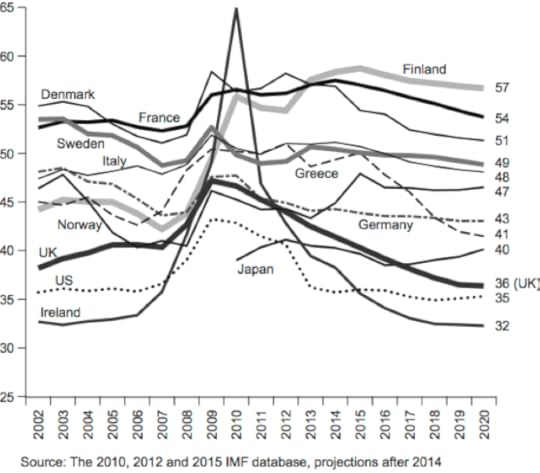
Figure 1: public expenditure as a proportion of GDP 2002-2020
May 22, 2019
What Brexit (and its aftermath) teaches us about Britain
With gratitude to the woman who founded the Brexit party for coming along and asking the world’s longest ever question. Hopefully you are intrigued.
The curse of the public Brexit lecture continues. Within just a few days of speaking on Brexit at The Heseltine Institute for Public Policy, Practice and Place, at University of Liverpool, (May 16th 2019) Michael Heseltine, “the 86-year old Tory ‘Tarzan’ and dog-throttler‘ had his whip removed by the Conservative party. What he was doing with the whip was unclear.
Click play below to listen to the talk, and listen out for Catherine Blaiklock, former geography university student, alumn of Christchurch College Oxford, and founder of the UK Brexit party asking her question. She was allowed to ask and ask and ask. She hadn’t turned up until near the end of the talk – but who needs to listen when they know so much 
Danny Dorling's Blog
- Danny Dorling's profile
- 96 followers



